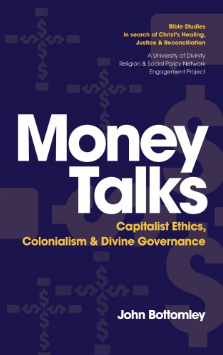Review: Money Talks: Capitalist Ethics, Colonialism and Divine Governance, Bayswater: Coventry Press, John Bottomley
I find the phrase “money talks” rather evocative. For me, it conjures images of smartly besuited people – specifically men – shaking chubby, orange-tinged hands on some dubious business deal involving property, a merger, or some shady aspect of our political life. It induces thoughts of eliteness, of exclusivity, perhaps even of secrecy, thoughts of an arena of wheelings and dealings unknown and inaccessible to the hoi polloi. “Money talks” gives voice to the prodding feeling many of us experience that numerous of the decisions made in our society are the result not of democratic voices but of economic ones. If money talks, what it says seems profoundly consequential, though many of us are not conversant in its language. It seems fitting, then, that Money Talks is the title of John Bottomley’s excellent series of studies on capitalist ethics and colonialism. Bottomley’s studies invite us to consider what money might be saying and to listen to its conversation with other important and interested voices.
The book is composed of a series of small group studies. It is not an academic treatise, but a group activity for laypeople, featuring readings, questions for reflection and discussion, and prayers. As such, Money Talks is not an attempt to break new theological or economic ground, but rather to aid the task of Christian discipleship as it pertains to the world of finance.

Indeed, in Money Talks, Bottomley does not offer much in the way of new insights in terms of biblical interpretation. Four out of five of the key passages explored come from Luke’s Gospel which has been a focal point of biblical scholars’ reflections on economic matters for some decades now. For those who have read, say, Ched Myers, William Herzog, or Jonathan Cornford, there is little here from an exegetical perspective that would count as new insight. But, then again, most Australian Christians have not read these authors and, as noted, Bottomley is not seeking to revolutionise biblical scholarship on economics. Money Talks is, to repeat myself, a set of studies aimed at laypeople. Bottomley makes some sharp economic-focused readings of Scripture available to the layperson and in doing so provides an important service to the church.
Where Bottomley does provide innovation is in his use of observations about our contemporary economic context, in particular those relating to the financial services industry. Each study oscillates between biblical reflection and testimonies from those working in the financial sector (taken from the University of Divinity’s Religion and Social Policy Network for Australia’s Finance Sector Union). These testimonies emphasise the ethical dilemmas faced by such workers and paint a disquieting picture of the state of the financial sector, even in the aftermath of the 2018 Royal Commission into banking. By knitting together biblical reflection and testimony from within the financial sector in this way, Bottomley brings the economic wisdom and judgement revealed in Scripture to bear on a realm of life that affects us all but that almost none of us understands.
Study One of Money Talks explores the connections between ethics and vocation within the context of capitalism, using Luke 4’s story of Jesus’ temptation as a starting point for considering our own ethical framework in contrast to the market ethics inherent within capitalism.
The second study focuses on Jesus’ rebuke of Herod’s corruption in Luke 13:31-35, asking readers to contemplate the corruption and oppression they see and experience in their work, as well as the roles of lament and whistleblowing in the struggle for justice. Study Three uses Jesus’ words on coming judgement in Luke 13:1-9 to encourage reflection on imagination and repentance. Bottomley suggests that repentance is a kind of conversion of the imagination, such that we begin to see things as they really are. He goes on to explore, using the work of Trawloolway theologian Garry Deverell, the way in which acknowledgement of colonial idolatry and listening to Indigenous voices are crucial to “liberation from falsehood and lies” (p. 45). Study Four uses Luke’s Parable of the Lost Son (Luke 15) to explore covetousness (qua sin against God and neighbour) and restorative justice. Bottomley considers the way in which the covetousness inherent in colonial capitalism’s approach to the world has led to environmental ruin and economic inequality. He suggests The Uluru Statement from the Heart might represent a voice yearning and hoping for a change of heart, much like the father in the parable.
The fifth and final study in Money Talks uses the story of Mary’s anointing of Jesus in John 12:1-8 to reflect on love and solidarity in the shadow of death. Here, the testimonies from workers in the financial sector, outlining instances of attempted suicide on account of the pressures, alienation, and abuses of power within the industry, are particularly poignant. Bottomley looks to the unconditional love between Mary and Jesus as an alternative to the soul-destroying work detailed by the aforementioned testimonies. Overall, the biblical reflections here are solid and well-articulated. There is the occasional questionable assertion – for example, the Pharisees being accused of “legalism” (p. 59), which is increasingly regarded as an outdated and somewhat anti-Jewish claim in contemporary New Testament studies. Further, depending on the education level of the group using the material, some points could be challenging, but generally it would suit most churchgoing audiences. At times the studies move quickly from one focus to another and, as a result, they can feel erratic. This necessitates that the group leader(s) have read through the material prior to using it with a group.
Talking about money is, as Bottomley’s introduction notes, a social taboo. Indeed, I suspect most Christians would prefer to discuss pornography than their money. But the questions asked by Bottomley’s book are important and these studies are well worth a look, particularly for those in the Australian context.
Matthew Anslow
This review has been reprinted from Uniting Church Studies volume 25 no. 1 2023 with permission













